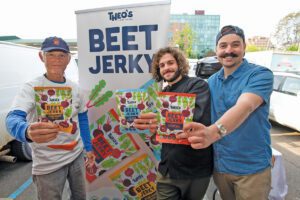Best friends since they met at Clague Middle School in 2007, Theo Mourad and Aaron Brodkey grew up in Ann Arbor with a deep appreciation for good food and where it comes from. After graduating from Huron High, they followed their parents to the U-M. Mourad studied psychology, community action, and social change, and earned money by working in restaurants and on farms. Brodkey studied sustainable food systems at the School for the Environment and Sustainability (SEAS). “We used to play tons of pickup basketball, lift weights, and then go cook together at one of our parents’ houses,” recalls Mourad. “So we kind of always shared the interest in food and food quality and were eating a lot of natural foods back then.”

Skinny Farm of Scio co-owner Tim Redmond, left, joined Theo Mourad and Aaron Brodkey for a May pop-up at the Ann Arbor Farmers Market. The “jerky” incorporates 96 percent of the beet, the packaging is compostable, and the greens are composted by the organic farms that supply the beets. | Photo: Mark Bialek
After college, Brodkey landed a dream job in a vegan food venture capital firm in New York City that develops and markets new brands, and Mourad cooked for the world-famous farm-to-table restaurant Blue Hill at Stone Barns in Tarrytown, New York, where he learned “just how delicious and amazing really high-quality produce could be,” he says. Mourad had just moved to Chicago to work in another farm-to-table restaurant when Covid hit.
With time on his hands, he started messing around in the kitchen and came up with a recipe for “beet jerky.” He sent some to his buddy Brodkey to see what he thought. At the venture fund, Brodkey’s job there included testing samples from companies that were seeking funding, Mourad says, “And he was like ‘Dude, this is better than like 95 percent of what I’ve tasted.’”
On a visit to Ann Arbor in 2021, Mourad brought samples to grocery stores and a few started stocking it, including Argus Farm Stop, where a two-ounce packet retails for $7.99. “The product was moving great,” he says, but “I was spending, like, eighteen hours a day in this little windowless kitchen slicing beets just to make a couple hundred bags.” He had to scale the operation and needed a partner. Brodkey decided to leave his cushy job at the venture capital firm and go into business with his friend in Chicago.
They incorporated in 2022, naming the brand Theo’s Plant Based and the parent company Arbor Foods, a nod to their hometown. After a long search, they found an organic foods manufacturer in Illinois that shares their commitment to minimal processing and zero waste: The “jerky” incorporates 96 percent of the beet, the packaging is compostable, and the greens are composted by the organic farms that supply the beets. One percent of their profits goes to urban farms in Chicago.
That same year, they were accepted into the Whole Foods Local and Emerging Accelerator Program and won a competition against 500 other Midwest brands to be marketed in Whole Foods stores throughout the region. In May, Theo’s Plant Based hit the shelves in every Whole Foods Market in the Midwest, including the two Ann Arbor stores.
The jerky comes in three flavors: salt and cracked pepper, sesame ginger teriyaki, and savory barbecue. Each two-ounce packet contains roughly one beet’s worth of jerky, in deep red, iron-rich disks that are chewy but tender and surprisingly flavorful for a low-calorie food.
Mourad and Brodkey regard both personal and environmental sustainability as guiding principles. “Taking care of each other is the most important part,” says Brodkey. “We came out of ZingTrain about a year ago and there’s a lot of value we took out of that.” (Part of the Zingerman’s Community of Businesses, ZingTrain teaches customer service, leadership, visioning, and business management.) “Aaron and I are pretty hard-nosed and driven, but we support each other and balance each other out,” says Mourad. “Theo and I took an hour-long bike ride yesterday, just because,” adds Brodkey.
Mourad and Brodkey return to Ann Arbor frequently to do demos and visit family and friends, and Mourad credits their hometown with exposing them to the organic, slow-food movement that is central to their business model. “The culture comes from us,” says Mourad. “We’re selling health and wellness. I’ve seen the toxic kitchen world, and it’s not what you want for anyone.”
—
This article has been edited since it was published in the July 2023 Ann Arbor Observer. A grammatical error and the location of the vegan venture capital firm where Brodkey worked have been corrected.